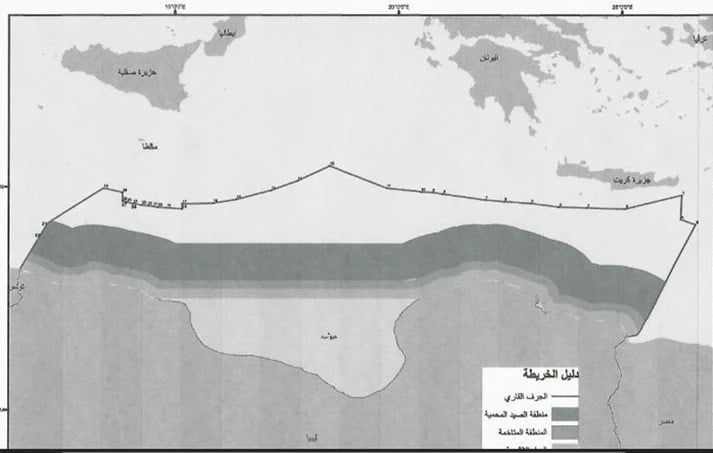Greece’s response
Her official statement on the external limits of her continental shelf in the Mediterranean was announced by the Libya to the Secretary -General of the United Nations, through verbal decoration in UN, which was submitted by the Libyan Permanent Delegation on May 27, 2025 as an official document of the 79th Session of the General Assembly, on the subject of the agenda for the “oceans and the law of the sea”.
In the Annex to the Declaration, which is accompanied by a detailed map and coordinate table, Libya exposes its positions and raises objections to recent actions of Greece and Egypt in the eastern and central Mediterranean.
Initially, Libya recalls that it signed a Memorandum of Understanding for the demarcation of maritime zones in the Mediterranean with Turkey on November 27, 2019, which “was duly registered at the UN Secretariat in accordance with Article 102 of the Statute Charter from December 11, 2019”. He highlights that “Neither Greece nor Egypt have sovereign rights in marine areas that have been bounded between Libya and Turkey in accordance with international law.”
Tripoli explicitly rejects the 2020 Greek-Egypt Agreement on EEZ delineation, describing it as “invalid and powerless” and “incompatible with international law, including the United Nations Convention on the Law of the Sea, especially in the principle of the principle”. In this context, he accuses Greece of granting licenses for hydrocarbon surveys “south of Crete in April 2024”, in violation of Libyan rights. As stated, “Greece continues its unilateral research and drilling activities in the so -called offshore concession areas from November 26, 2022, with complete contempt for Libya’s sovereign rights and a blatant violation of established rules and practices”.
Libya rejects Maritime Spatial Plan presented by the Greek Foreign and Environment & Energy Ministries on April 16, 2025, arguing that “Some areas in the southern part of the Greek map MSP violate the Libyan continental shelf”in which, as reported, Libya has “IPSO Facto and Ab initio) sovereign rights and jurisdiction in accordance with international law”. It is clarified that “the Greek maritime spatial planning will have no legal force against Libya”.
Libya also complains about the Greek decision of April 17, 2025, to declare EEZ in the Ionian Sea, through Government Gazette No. 59, arguing that the southern boundary of the zone “is not equal between the main coasts of Libya and Greece” and that “it”. It is also emphasized that this action is “contrary to the fundamental principles of international sea law”, as the relevant provisions encourage states “to pursue practical provisional regulations and not prevent the conclusion of the final agreement”.
Libya explicitly states that “It fully rejects the illegal and maximalist claims of Greece and Egypt in terms of maritime borders, as well as the corresponding concession permits in the Eastern Mediterranean.”
Looking at coordinates and maps, Libya describes in detail the design of its continental shelf, from points B and A to the east (demarcated with Turkey under the 2019 Memorandum), to the demarcation points with Italy (including the island of Sikhi). 1982 and 1985.
Tripoli reiterates that “the demarcation of maritime borders between two sovereign states must be determined through dialogue and negotiations on the basis of international law and the principle of responsibility”. Adds that It is prepared to negotiate with all coastal neighboring states and calls for Greece and Egypt “to suspend all hydrocarbon mining licenses and their research activities in these areas, until the relevant marine differences are resolved through negotiations and valid agreements. “
“Greece will continue on the path of international law”
Athens is trying to downplay the aspirations of Tripoli as well as the tension that causes the new verbal intercourse in Greek -bibli.
“These positions have been put in the past and has been properly answered by Greece and Egypt. International law is not invoked by unilateral verbal intercourse, nor by pious wishes of third parties. Such positions do not refer to the preparedness for re -establishment of talks on the demarcation of a continental shelf and an exclusive economic zone under international sea law. Greece will continue on the path of international law and the solid regional alliances that multiply its diplomatic power. Unlike invalid and non -existent agreements, Greece is walking and acting under international law and does not hesitate to directly formulate its positions in every interlocutor, as the Foreign Minister has recently done during his visit to Libya, “diplomatic sources said.
